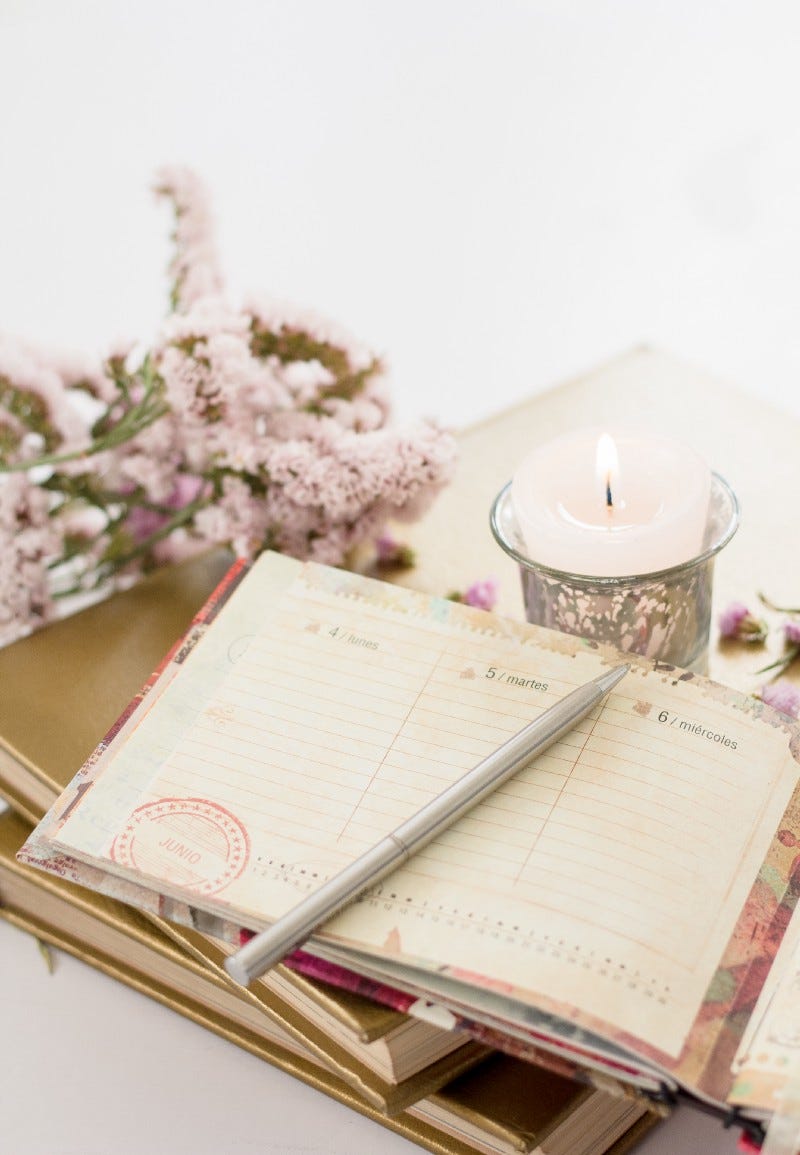Quit Resisting Journaling and Use it to Improve Your Writing
Maintaining a journal can help your writing in many ways.
Maintaining a journal can help your writing in many ways.

Article after article suggests that journaling is good for you in a number of ways, including your mental health. Studies show that journaling is linked to reducing stress, helping to deal with traumatic events, and increasing your physical health (it boosts your immune system and lowers blood pressure). It has even been shown to help in sports performance and reduce employee absenteeism. (You can read more about these studies here.) And that is all well and good–really good.
But how can journaling improve your writing?
Many of famous writers have extolled the benefits of journaling. And with good reason — the journal of a writer turns into a writer’s notebook, bursting with ideas, snippets of overheard dialogue, deep thoughts, plot ideas, character sketches, and more.
Journaling becomes a process of deep interaction with the world, your first line of defense in observing, processing and integrating.
I’m an off-and-on journaler. I’ve had periods in my life–long stretches, like ten years–when I got up every day and wrote in a journal first thing. (And to prove it, I’ve got three huge tubs of them.) I’ve also had journaling droughts, where I don’t actively write in a diary. Journaling was my first entry into writing. When I was a kid, I received one of those locking diaries as a gift when I was around ten, and I’ve journaled off and on ever since.
When I write in my journal regularly I am more productive and creative than the times when I am not.
But journaling is good for everybody from writers to visual artists to musicians to business people — all kinds of creatives and even people who don’t consider themselves creative. Journaling helps you sort things out, process life, and come up with ideas. And I don’t care what you do in the world, those are valuable processes for everyone.
For writers, one of the biggest benefits I see is that it helps us see life as story, and that stories abound in life.
But sometimes, I will admit, I open my journal and my pen hovers over the page and I can’t think of anything to write. Just like when you’re working on your WIP, right? So what processes can you use to get words on the page in your journal?
Journaling Techniques

Account of day to day life
This is probably the most traditional kind of journaling, the kind of activity we used to call writing in a diary. It can be a great starting point for a journal entry (see below). Austin Kleon calls it keeping a logbook, and makes a case for doing it regularly. It is probably the kind of journaling I do least, but when I’ve actually done it, I love looking back on the accounts of my days.
Idea incubator
This is one of the best reasons to keep a journal as a writer. I think every writer should have some kind of notebook where you record ideas, things they’ve seen, books to read, etc., even if you don’t actively write journal entries. (You might like the bullet journal idea below for this.)
To sort things out
This is the kind of journaling the mental health professionals want you to do, and with good reason–because it works. Process your crap on the page and deal with it, instead of waiting for it to come out at an inopportune moment. (Talkin’ to myself here, too.) It can also take the form of expressive writing, in which you might write reactions to a poem, a prompt, or inspiration from nature.
The Collateral Benefits of Cultivating a Passion
This afternoon, I’m heading to the beach for a few days and on the way I’m stopping in at a winery to meet friends…medium.com
As a vessel for the spiritual
Those of us on a spiritual path know that writing in a journal can help you figure out your relationship with the divine, talk to God, converse with angels or spirits–whatever you desire. I would go so far as to suggest that journaling can become a form or meditation or prayer. I know it often is for me. My favorite writer for this is Janet Connor.
As a bullet journal
I use a bullet journal sporadically. It is still the best system I’ve found to keep my life together. Until I found this system I was constantly searching for the best way to organize my life on paper. But the bullet journal is much more than just an organizer or planner–it can hold all your thoughts and ideas. Mine has become a hybrid which I use for my journaling entries as well. If you are interested in this system start with the original link, and then google “bullet journal.” You’ll find a ton of helpful post and articles about it, complete with clever hacks. I find mine works best, though, if I keep it as simple as possible. I’m not particularly interested in making my page as pretty as possible. I see it as a tool.
Morning pages
Julia Cameron popularized this version of journaling in her book, The Artist’s Way, and it is a perennial favorite because it works. The process is simple–you get up and you write three pages without thinking. That’s it. You don’t have to craft beautiful sentences or write about how your boyfriend stood you up. Just write and see what comes up. Not only is it helpful to get your ya-yas out, over time, certain themes will emerge that may help you see your life more clearly.
When Free Writing Works…and When It Doesn’t
You’re in the middle of writing a chapter of your novel and suddenly you are stuck. What to do? How to work yourself…medium.com
A space for free writing
Sometimes you don’t know what to write but you know you want to write. Your journal is the perfect place for this. Grab yourself a prompt and have at it. Set a timer and write for 20 minutes without lifting the pen from the page. Miraculous things will emerge.
A place to write about your current WIP
I spend a lot of time writing about my current novel. If I get lost in the plot, I write about where I might go. I write about characters and their back story. I write about the homes they live in and the places they work. Writing in a journal is a godsend for helping you figure out your story. You may want to keep a separate notebook for this, so you can easily access the information when you need it.
Make lists
Sometimes, a simple list can provide fodder for future writing. On a vacation in Mexico, I was overwhelmed with the sensory details of our location. But I didn’t have time to journal. So I kept lists of descriptive words and phrases. When I returned home, I used these lists to write a short story.
Tips:
Start where you are.
I had a friend who found journaling a great help when she went through cancer, but then she stopped. She wanted to get started again, but felt she had to commit to the page everything that had happened since she had last written. Nope. Just start where you are, with whatever you want to write about.
Index!
This sounds tedious and overly organized, but it is a lifesaver. It is a key part of the bullet journal and I’ve started using it for my all my journals. Label a page at the front or back of the book as an index, then number your pages and when you write something you want to keep track of, note it. The Leuchtturm journals not only have page numbers already printed on them, but also a gorgeous rainbow of colors!
How to Establish a Regular Writing Practice
So here we go with some advice on how to establish a regular writing practice.medium.com
Keep at it
As with everything we do, at first it can seem awkward and useless. But the more you write in a journal, the more you’ll see the various benefits and keep at it. Writing in a journal regularly helps facilitate flow in all your writing, and that will encourage you to maintain a regular writing practice for your other work.
Maintain a list of prompts
It’s really helpful to have a page in your journal where you write down prompts and then if you don’t know what to write about, there you are. Google for tons of options.
If you really get stuck, go back to the day before and write what happened.
It’s as good a starting point as any! Begin with even the tiniest of things that happened. What you ate for lunch, what you saw on a walk, what happened when you chatted with your neighbor after work. One of my favorite exercises for getting to know a fictional character is to write her ordinary day — what happens from the time she wakes up until she goes to bed? Your ordinary day might help illuminate one of your character’s.
This post contains affiliate links
Charlotte Rains Dixon is the author of the novel Emma Jean’s Bad Behavior (Vagabondage Press, February 2013), and articles published in magazines such as Vogue Knitting, The Oregonian and Pology, to name only a few, and her short fiction has been published in Somerset Studios, The Trunk and the Santa Fe Writer’s Project. She earned her MFA in creative writing at Spalding University in 2003, and has been teaching and coaching writers ever since, both privately and as an adjunct professor at Middle Tennessee State University’s Write program. She’s been blogging about writing, creativity, and motivation at charlotterainsdixon.com since 2007. She is repped by Erin Niumata at FolioLiterary. Visit her website at charlotterainsdixon.com and her travel site at letsgowrite.com.



